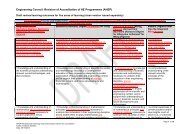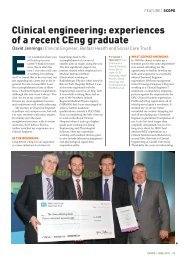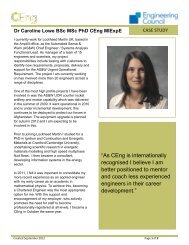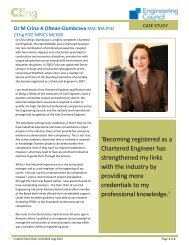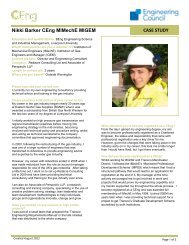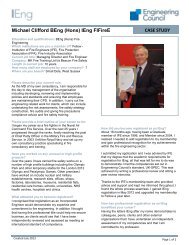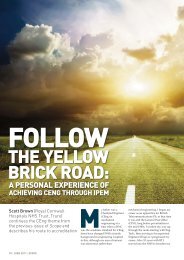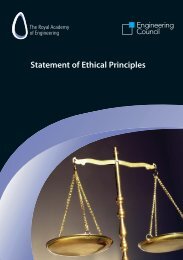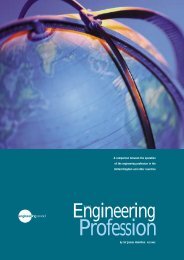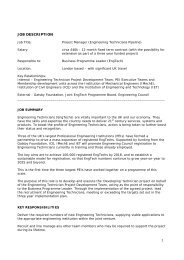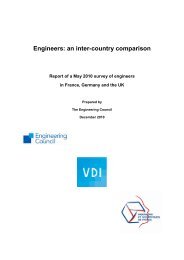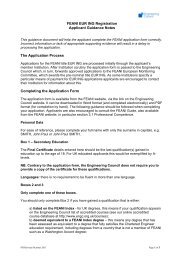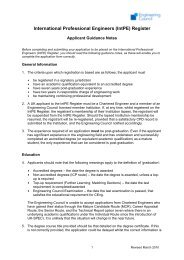An Engine for Change - A Chronicle of the Engineering Council
An Engine for Change - A Chronicle of the Engineering Council
An Engine for Change - A Chronicle of the Engineering Council
Create successful ePaper yourself
Turn your PDF publications into a flip-book with our unique Google optimized e-Paper software.
Chapter 4 – 1988 to 1990 : The Barlow YearsA High-Water MarkPeopleThe Third Chairman and <strong>the</strong> Second Director-General.A double change at <strong>the</strong> top <strong>of</strong> <strong>the</strong> EngC took place in 1988. The EngC’s third Chairman, SirWilliam Barlow BScTech HonDSc, HonDTech, FEng, FIMechE, FIEE, was elected on 17May 1988, a post he held until 31 December 1990. He was already Chairman <strong>of</strong> BritishInsulated Calendar Cables plc and Non-Executive Director <strong>of</strong> both Thorn EMI plc and <strong>of</strong>Racal Telecom plc. From <strong>the</strong> outset Sir William’s wish was to use <strong>the</strong> EngC as <strong>the</strong> plat<strong>for</strong>m<strong>for</strong> promoting <strong>the</strong> engineering pr<strong>of</strong>ession to Government and <strong>the</strong> public, and also <strong>for</strong>commenting at a national level on issues having an engineering involvement. This was rightin line with Monty Finniston’s original concept <strong>of</strong> <strong>the</strong> EngC as an “<strong>Engine</strong> <strong>for</strong> <strong>Change</strong>”. SirWilliam also wanted to work harmoniously with <strong>the</strong> <strong>Engine</strong>ering Institutions. Accordingly,on assuming <strong>of</strong>fice he immediately met privately with some 15 Presidents on an individualbasis and repeated this exercise with Institution Secretaries. Whilst each President appearedprepared to co-operate with <strong>the</strong> new management, limited headway was made as each waselected on a different date and in most cases <strong>for</strong> only one year.Two and a half months after Sir William’s appointment <strong>the</strong> second change at <strong>the</strong> top <strong>of</strong> <strong>the</strong>EngC took place. On 1 August Denis E Filer TD, BSc, BA, FEng, FIMechE, FIChemE,CBIM, Director <strong>of</strong> <strong>Engine</strong>ering at ICI, with which he had worked since 1955, took over fromDr Kenneth Miller as Director General. Denis Filer had been on <strong>the</strong> EngC <strong>Council</strong> since May1986, and so was well versed in its current aspirations.In his endeavours Sir William worked closely with <strong>the</strong> new Director General. Denis Filer’spersonal style was helpful as he was nei<strong>the</strong>r aggressive nor confrontational and as a VicePresident <strong>of</strong> <strong>the</strong> Institution <strong>of</strong> Mechanical <strong>Engine</strong>ers he knew that body particularly well.The new Chairman and Director General openly held regular combined meetings with <strong>the</strong>Presidents and Secretaries <strong>of</strong> <strong>the</strong> four big Institutions (in addition to <strong>the</strong> <strong>Engine</strong>eringPr<strong>of</strong>essional Forum), but as Sir William later commented: “There never seemed to be <strong>the</strong>same four Presidents at consecutive meetings because <strong>of</strong> <strong>the</strong>ir election dates. Typically a newPresident would arrive with little real knowledge <strong>of</strong> <strong>the</strong> interface but with lots <strong>of</strong> anecdotallybasedprejudice which usually had been displaced by <strong>the</strong> third meeting - but at <strong>the</strong> followingmeeting a successor would appear. The Secretaries all had axes to grind but shared a commondetermination to defend <strong>the</strong>ir positions and oppose any increased financial support <strong>for</strong> <strong>the</strong>EngC. The Institution <strong>of</strong> Chemical <strong>Engine</strong>ers and <strong>the</strong> Institution <strong>of</strong> Electrical <strong>Engine</strong>ers were<strong>the</strong> most intransigent at this time.”Not that <strong>the</strong> faults were necessarily all one way. A later <strong>Council</strong> member James McHughobserved:“Relationships depended, to a great extent, on <strong>the</strong> personalities involved. The representatives<strong>of</strong> <strong>the</strong> EngC and <strong>the</strong> bodies with which <strong>the</strong>y dealt, were continuously changing andsometimes <strong>the</strong> rapport was better than at o<strong>the</strong>rs. I gained <strong>the</strong> impression that, at times, <strong>the</strong>representatives <strong>of</strong> <strong>the</strong> EngC could have been more diplomatic when <strong>the</strong>y were dealing withrepresentatives <strong>of</strong> Institutions.”57



